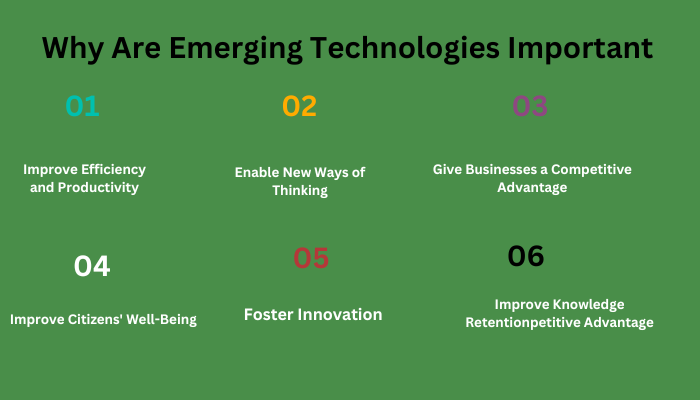Learn about Why Are Emerging Technologies Important. Emerging technologies are literally transforming industries, economies, and societies by driving efficiency, innovation, and solutions to global challenges. From AI to blockchain, IoT, and others, discover how they can be transformative forwards in progress and quality of life.
Introduction
Emerging technologies are bound to transform the future of society, industries, and economies. These advances can bring innovations along with new solutions to many of the most complicated global challenges which can enhance efficiency and improve the overall quality of life.
What is Emerging Technologies?
The role of emerging technologies in transforming the future of societies, industries, and economies for tomorrow holds glimmering significance. Innovation and new solutions through emerging technologies offer potential ways to solve some of the highly complex global challenges for greater efficiency and improvement in quality of life.
Emerging technologies power progress and advancement by introducing different kinds of innovative solutions for new and complex problems boosting efficiencies, and providing new opportunities for people.
They are still at an early stage of developing their full impact, although they appear to be powerfully transformational in the future for redefining traditional processes, improving the quality of lives, and solving global problems. Up-to-date information about emerging technologies becomes a necessity for every single individual and organization to adapt to the competitive world.
Why Are Emerging Technologies Important
1. Improve Efficiency and Productivity
Emerging technologies optimize operations through routine task automation and workflow enhancement. By reducing human effort, such technologies also minimize mistakes while powering up output and faster-reaching targets. This means money saved and productivity increased across the board, the basis of creating and establishing sustainable growth and success over time.

2. Enable New Ways of Thinking
Emerging technologies bring new-age tools and methods that drive innovative minds. It disrupts older ways of doing things and introduces ways of thinking that solve complex problems. This enables firms and people to think in creative designs so that they can face a changing world with its dynamism and also catch up with so-called impossible opportunities.
3. Give Businesses a Competitive Advantage
Emerging technologies, therefore, enable faster agility and innovation to be more competitive than others. It helps the company see what is coming to neighboring markets meet customer needs in a better way, and provide better products or services all while not undermining a lead in technology that is becoming a lead in the industry to be growth and eventually monetary dominant forever
4. Improve Citizens’ Well-Being
Emerging technologies bring forth advanced healthcare, wise cities, and education accessibility. AI improves medical diagnostics, IoT optimizes public infrastructures, and AR/VR revolutionizes learning. All these have made communities much safer, healthier, and more sustainable, thus directly improving citizens’ overall quality of life and bringing many opportunities for personal and societal development.
5. Foster Innovation
Emerging technologies function as a stimulus to innovation in their outreach. It classifies the events concerned with various industries. It also encourages research and development resulting in innovative products and services. Most barriers have been broken and possibilities redefined by this technology in the case of the complex global challenges and newly-acquired economic and social openings.
6. Improve Knowledge Retention
Technologies such as AR and VR make learning much more immersive and exciting. Such immersions improve understanding and long-term retention. It gives hands-on experiences that will cater to and encourage varied learning styles, making knowledge acquisition easier and ensuring long-term retention of skills in both academic and professional contexts.
Examples of Emerging Technologies
1. Artificial Intelligence (AI)
AI, short for artificial intelligence, is that technology that allows machines to learn and reason so that they can execute tasks that humans usually do. It is primarily what makes the difference in saving time and automating decision-making in industries such as healthcare, finance, and customer service.
2. Blockchain
Blockchain, in its formulation, is really to deliver safe, open, and non-centralized new systems for managing data and transactions: it changes entire industries, finance, supply chains, or digital identity in an enhanced trust and efficiency way.
3. The Internet of Things (IoT)
IoT connects real-world devices on the internet in real-time for a speedy exchange of data. Most importantly, sectors like health, manufacturing, and cities have benefited from automation controlling and efficiency improvement.
4. Augmented Reality (AR)
With AR, the digital content gets overlaid onto reality, for instance, in education, retail, and healthcare. Because it allows one to have tools that are more interactive in learning, marketing, and diagnostics.
5. Virtual Reality (VR)
VR is an innovative environment used in creating an all-new immersive digital space for training, entertainment, and collaboration purposes. Learning, design, and gaming become much richer experiences, offering solutions to a unique variety of professional applications.
6. Cloud Computing
Cloud computing will give excellent and sonorous storage and processing services for data-wise provision. It will make more accessible and collaborated, flexible, and available ways for businesses to respond to changes in demand efficiently.
Characteristics of Emerging Technologies
Novelty
Novelty and innovation characterize emerging technologies; they introduce new ideas, methods, or solutions that tend to conflict with the old paradigms. Quite naturally, such newness will distinguish emerging technologies, giving rise to breakthrough opportunities across sectors-from healthcare to manufacturing-opening doors to new business and societal possibilities.
Disruptive Potential
Emerging technologies have the potential to transform and change the scenario of an industry and the market itself. It would often replace existing legacy systems by changing how things generally work.
Disrupting the status quo through innovative business models or challenging conventional business practices makes emerging technologies a competitive advantage and changes the power equation in global markets.
Rapid Evolution
Emerging technologies’ development speeds are thus faster than those of regulations or society to adapt. The cycles of development speed up due to continuous research and funding. Rapid evolution needs agility from both business and other stakeholders to keep pace with technology and still be competitive in their industries.
Prominent Impact
Emerging technologies are strongly influencing different domains. The applications often tackle urgent problems, provide efficiencies, and add amazing new functionalities. Their complete adoption will transform economies, societies, and everyday life: fundamentally changing along the way making them significant pieces of future shaping.
Uncertainty and Ambiguity
Emerging technologies are unknown and so tend to have unpredictable outcomes. Questions may arise regarding their ethics, scalability, or long-term viability. Such ambiguity creates risks and opportunities simultaneously and needs careful assessment and planning. Innovators and adopters are required to think ahead for proper planning in evaluation and strategy design.
Cons of emerging technologies
| Cons of Emerging Technologies | Description |
| Privacy Concerns | Emerging technologies often require massive data collection, which raises concerns about privacy issues and internal security breaches. |
| Negative Impact on Health | Prolonged exposure to the given technology, such as a screen or radiation from devices, may be troublesome for physical as well as mental health. |
| Reduced Face-to-Face Interactions | High dependence on digital technologies can show a decrease in personal interactions, thereby directly affecting social connections and communication. |
| Increased Dependency on Technology | Dependency can happen in situations when reliance is subject to emerging technologies, thus making an individual and businesses vulnerable to the system’s failure. |
| Costs and Resource Allocation | Emerging technologies often travel with high costs because there should be a lot spent on infrastructure, training, and maintenance. |
The Future of Emerging Technologies
The future of emerging technologies looks very thrilling and unpredictable. Promises that artificial intelligence or quantum computing will take all the hammers and nails used in industries to shape them into new forms, plus so many other developments in renewable energy and biotechnology, indicate a promising future.
However, among the possibilities therefore remaining, we have been challenged to ensure that those technologies are benefited responsibly by society as we adopt them. Emerging technologies represent the cutting edge of human ingenuity, offering opportunities like no other to reshape the future. From grasping their potentialities, challenges, and possible applications, we can tap into their power to forge a better world.

Conclusion
Emerging technologies are critical for promoting progress, addressing the most urgent challenges, and transforming living and working conditions. They transform industries, promote sustainable practices, and allow better global connectivity, making them the basis of future development.
Investments in and adaptation to these technologies entail a competitive advantage as well as access to a more just, innovative, and resilient society. The more these developments evolve, the more important they will become in contributing to a brighter and more promising future for everyone.






